The president of the United States, the founder of the Center for the Education of Women, a renowned jazz musician, a pioneer in solar innovation, a legendary broadcast journalist and a former U-M provost now serving as president of the National Academy of Engineering will receive honorary degrees at spring commencement.
Barack Obama, the 44th president of the United States, will receive an honorary Doctor of Laws degree and will deliver the address at Spring Commencement.
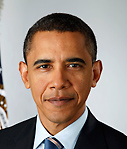
Obama. Photo courtesy The White House.
Also receiving honorary degrees at the 11 a.m. May 1 ceremony in Michigan Stadium are:
• Jean Campbell, founder, Center for the Education of Women.
• Ornette Coleman, jazz musician.
• Stanford Ovshinsky, president, Ovshinsky Innovation LLC.
• Susan Stamberg, public radio broadcast journalist.
• Charles Vest, president, National Academy of Engineering.
The honorary degrees were approved last Thursday by the Board of Regents.
Campbell will receive a Doctor of Laws. Campbell has been a leader of educational innovation throughout her lifetime, serving as the founding director of the Center for Education of Women (CEW), and addressing the role of women in higher education at a national level. After earning her bachelor’s degree in psychology and master’s degree in education at Northwestern University, she eventually moved to Ann Arbor in 1946, becoming active in the League of Women Voters, then became the first director of the CEW at U-M in 1964.
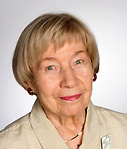
Campbell. Photo courtesy Jean Campbell.
The CEW developed an institutional response to the issue of women’s truncated access to a university education following World War II, creating policies that became the firm foundation for the advancement of the CEW at the university. This more welcoming climate particularly supported women whose education had been interrupted and who were returning to earn degrees. Campbell was instrumental in establishing a broad focus and solutions for these issues.
Campbell also became active at national and international levels, initiating a conference on research on women at the University of London and serving on a panel for alternative approaches to graduate education, sponsored by the Council of Graduate Schools at the Graduate Record Examination Board. She has been inducted into the Michigan Women’s Hall of Fame and has received the U-M Academic Women’s Caucus Sarah Goddard Power Award.
Coleman, a leading composer and performer of jazz, will receive a Doctor of Music. Born in Fort Worth, Texas, in 1930, he taught himself how to play the saxophone and had formed his first band by the age of 14. After touring with a traveling ensemble, he performed with a rehearsal ensemble that allowed him to experiment with the new theoretical concepts he was developing that combined southwestern country blues and his own interpretations of music theory.
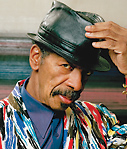
Coleman. Photo by Jimmy Katz.
The first of his many influential albums was recorded in 1958, released under the title “Something Else,” which launched him as a major innovator of jazz. His music, freed from the conventions of harmony, rhythm and melody, both polarized and transformed the jazz community, and he devoted decades to understanding and discovering the shape of not just jazz, but all music to come. He released 20 albums in the 1960s.
His honors include several honorary degrees, appointment as a MacArthur Foundation Fellow, induction into the American Academy of Arts and Letters and the presentation of the prestigious Praemium Imperiale Award of the Japanese government. In 2007 he was honored with a Grammy Lifetime Achievement Award, and won the Pulitzer Prize in Music in 2007 for his album “Sound Grammar.” In 2009 he became the 16th musician in history to be presented with the Miles Davis Award.
Ovshinsky will receive a Doctor of Science from the university. Ovshinsky has dedicated his life to creating an entirely new area of physics and materials science, providing innovation in atomic engineering of amorphous and disordered semiconductors. In 1960 he and his late wife, Iris, founded the company Energy Conversion Devices Inc. (ECD), to further develop and apply his inventions to the fields of information and energy creating a new field known as “ovonics,” which attracted many scientists and technologists. The materials developed by Ovshinsky resulted in unique switching devices, phase change memories, optoelectronic copying and flat-panel liquid crystal displays.
Ovshinsky holds more than 400 U.S. patents, some of which led to remarkable new approaches to the uses of solar power and hydrogen-fueled vehicles. He has formed a new company named Ovshinsky Solar LLC in order to accelerate his work in energy, leading to basic solutions for pollution, climate change gases and the need for oil.
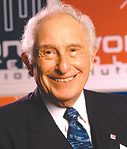
Ovshinsky. Photo courtesy Stanford Ovshinsky.
Ovshinsky has authored more than 300 scientific papers, and has received many honors including the Diesel Gold Medal for Invention, presented by the Deutscher Erfinder-verband (German Inventors Association), the 2005 Innovation Award for Energy and the Environment by the British publication The Economist, and the 2008 Engineering Society of Detroit Lifetime Achievement Award. Additionally, he and his wife were named Heroes of Chemistry by the American Chemical Society. He has numerous honorary degrees, was inducted into the Michigan Chemical Engineering Hall of Fame, and is a fellow of the American Physical Society and the American Association for the Advancement of Science.
Stamberg will receive a Doctor of Humane Letters. Stamberg is a legendary reporter and interviewer in the world of radio broadcasting, and currently holds the position of special correspondent for National Public Radio.
Born in New Jersey, she was raised in New York City, where she earned a bachelor’s degree from Barnard College. Following an initial job at the New Republic magazine, she worked as a producer of a weekly current events discussion program at WAMU-FM in Washington, D.C. In 1971 she was hired by National Public Radio in its first year. By 1972 she was recruited to be the first woman to anchor a national nightly news program as the co-host of “All Things Considered.” In 1987 she launched another NPR program that has become part of the aural American landscape, “Weekend Edition Sunday.”

Stamberg. Photo by Anthony Nagelmann.
Stamberg has won major broadcasting honors, including the Edward R. Murrow Award, the Alfred I. duPont Award, and the Distinguished Broadcaster Award from the American Women in Radio and Television. She has been inducted into the Radio Hall of Fame, the Broadcasting Hall of Fame, the American Academy of Arts and Sciences, has received numerous honorary degrees, and is a Fellow of Silliman College at Yale University. She has authored several books, including “Every Night at Five” (1982), and “Talk: NPR’s Susan Stamberg Considers All Things” (1993).
Vest will receive a Doctor of Laws. Vest has devoted his career to providing leadership and illumination on issues related to higher education, science and engineering. He is president of the National Academy of Engineering and is president emeritus and professor of mechanical engineering at the Massachusetts Institute of Technology (MIT). Born in West Virginia, he earned his bachelor’s degree in mechanical engineering at West Virginia University, then attended U-M for his master’s and doctoral degrees in mechanical engineering. He was appointed assistant professor at U-M in 1968, conducting research in heat transfer and engineering applications of laser optics and holography. After becoming a full professor, he served as associate dean and dean of the College of Engineering until 1989, when he became provost of the university. Vest also will be the University Graduate Exercises speaker on April 30.
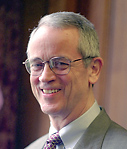
Vest. Photo courtesy Charles Vest.
In 1990 he was selected president of MIT and served in that position until December 2004. As president of MIT, he was active in building partnerships among academia, government and industry and in championing open, global scientific communication and sharing of intellectual resources.
In addition to numerous honorary degrees, he has been presented many professional awards, including the Arthur M. Bueche Award from the National Academy of Engineering, the Philip Hauge Abelson Prize of the American Association for the Advancement of Science, and induction into the American Academy of Arts and Sciences and the American Philosophical Society. He was awarded the 2006 National Medal of Technology by President George W. Bush.

